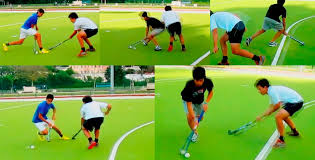hockey life in pakistian

Hockey skill training covers a broad range of aspects essential for players to excel in the sport. Here are some key areas often focused on in hockey skill training:
Skating: Mastering skating technique is fundamental in hockey. This includes stride efficiency, crossovers, transitions, and agility drills to improve speed and maneuverability on the ice.
Stickhandling: Developing precise control over the hockey stick is crucial for maintaining possession, maneuvering around opponents, and executing plays. Players practice various drills to improve their stickhandling skills, such as dribbling through cones, puck control in tight spaces, and deking techniques.
Shooting: Effective shooting involves power, accuracy, and quick release. Players work on shooting accuracy, different shot types (wrist shot, slap shot, snap shot), shooting off the pass, and shooting in stride.
Passing: Good passing skills are essential for maintaining possession, creating scoring opportunities, and executing team strategies. Players practice passing accuracy, timing, and technique, including saucer passes, backhand passes, and receiving passes under pressure.
Positional Play: Understanding the game's strategic aspects, such as defensive positioning, offensive tactics, and transitional play, is critical for success. Coaches emphasize proper positioning, reading the play, and making smart decisions on the ice.
Physical Conditioning: Hockey is a demanding sport that requires strength, endurance, and agility. Players undergo off-ice conditioning programs tailored to improve their physical fitness, including strength training, cardio workouts, and flexibility exercises.
Game Awareness: Developing hockey IQ involves understanding game situations, anticipating plays, and making split-second decisions. Coaches incorporate drills and scenarios to improve players' awareness and decision-making abilities during gameplay.
Special Teams: Training for power plays and penalty kills involves specific strategies, positioning, and execution. Players practice power play setups, penalty killing formations, and situational awareness to maximize their effectiveness in these situations.
Goalkeeping: Goalkeepers undergo specialized training to develop their unique skills, such as lateral movement, positioning, glove saves, blocker saves, and rebound control.
Teamwork and Communication: Effective communication and teamwork are essential for success in hockey. Players work on building chemistry, communicating on the ice, and supporting each other to achieve common goals.
Consistent and focused training in these areas can help hockey players improve their overall skill level and performance on the ice.




Comments
Post a Comment